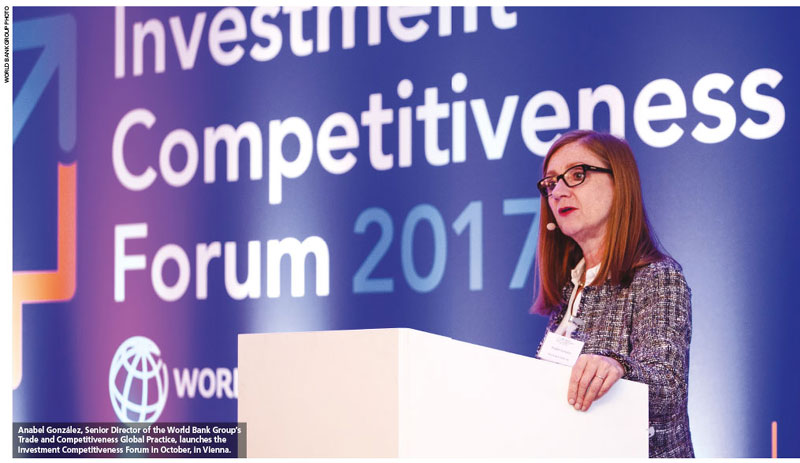FDI OUTLOOK
THE SCRAMBLE FOR INVESTORS
Yamini Sequeira reports on a recent forum that identified the must-haves to attract foreign investors

Understanding what drives foreign direct investment (FDI) is a key focus here in Sri Lanka, which may gain from insights shared at the recent Investment Competitiveness Forum hosted by the Trade and Competitiveness Global Practice of the World Bank Group in Vienna. The sessions unearthed a number of imperatives for any country to unlock much needed FDIs.
A report released at the forum lists a stable business environment, effective regulations and political stability as being among the significant drivers of foreign investment inflows to developing countries.
More than US$ 2 trillion in FDIs was invested around the world in 2016 with the US leading the list as the most attractive. India, China and Singapore were the only Asian countries that made it to the list. In 2016, over 40 percent of global FDI flows were directed to developing countries providing much needed private capital.
“A business friendly legal and regulatory environment – along with political stability, security, and macroeconomic conditions – are key factors for multinational companies making investment decisions in developing countries,” said Anabel González, Senior Director of the World Bank Group’s Trade and Competitiveness Global Practice.
They’re ahead of other variables such as infrastructure, talent and skills, and low cost labour and inputs. Most investors find the legal and regulatory environment “important” or “critically important,” which suggests that it weighs heavily on their decision to invest, the report adds.
More significantly, the World Bank recommends that central banks should ensure a smooth normalisation of monetary policy through well communicated plans on unwinding securities and guidance on prospective changes to policy frameworks.
It adds that “borrower based measures should be introduced and/or tightened to slow fast-growing overvalued segments and bank stress tests must assume more stressed asset valuations. Capital requirements should be increased for banks that are more exposed to vulnerable borrowers to act as a cushion for already accumulated exposures and incentivise banks to grant new loans to less risky sectors.”
Indeed, it is reassuring to note that some of these measures are already in place in Sri Lanka’s banking and financial system.
Interestingly, FDIs flowing out of developing countries was one of the highlights of the forum. This form of investment has increased twentyfold in the last two decades and by 2015, it made up a fifth of global FDI flows. While much of this investment comes from BRICS nations (Brazil, Russia, India, China and South Africa), some 90 percent of developing countries are now reporting outward FDIs.
The report details how the benefits of FDI can be magnified in economies with good governance, well-functioning institutions, and transparent and predictable legal environments. Given that most nations offer incentives, investment promotion agencies are under pressure to match or even surpass offers by competing countries to compensate for adverse geographic locations, small size or distance to markets in order to remain attractive to foreign investors.
Regulatory simplification, removing barriers to investment entry and addressing infrastructure constraints rank among the important confidence building signals that can produce early results, and trigger a private sector response.
The ‘Top Five Findings’ of the Global Investment Competitiveness Survey reveal that investors who desire export oriented efficiency seek internationally cost competitive destinations, and potential export platforms with value linkages, incentives, trade agreements and investment promotion agency (IPA) services.
Further, more than a third of investors reinvest all their profits in the host country. Investors value policies that help them expand their businesses more than those promoted by governments to attract them.
In addition, investor protection guarantees are critical for retaining and expanding investments in the long term across all forms of FDIs. Over 90 percent of all investors rate various forms of legal protection as important or critically important including the ability to transfer currency in and out of the country, and the existence of legal protection against expropriation, breach of contract and non-transparent or arbitrary government conduct.
Investors strongly value the existing capacity and skills of local suppliers. But they also say that government support – such as providing information on the availability of local suppliers – matters. With foreign investors sourcing about 43 percent of their production inputs locally, supplier contracts and linkages with local businesses have the potential to deliver major benefits for the local private sector.
Some 30 percent of investors surveyed have experienced shutting down an affiliate in a developing country due to unstable macroeconomic conditions, and increased policy and regulatory uncertainty.
Of far greater importance however, is the level of legal protection against political and regulatory risks such as expropriation of property, currency transfers and convertibility restrictions, and a lack of transparency in dealing with public agencies.
So as far as Sri Lanka is concerned, reducing these risks could perhaps lead to an improvement in FDIs.





Leave a comment